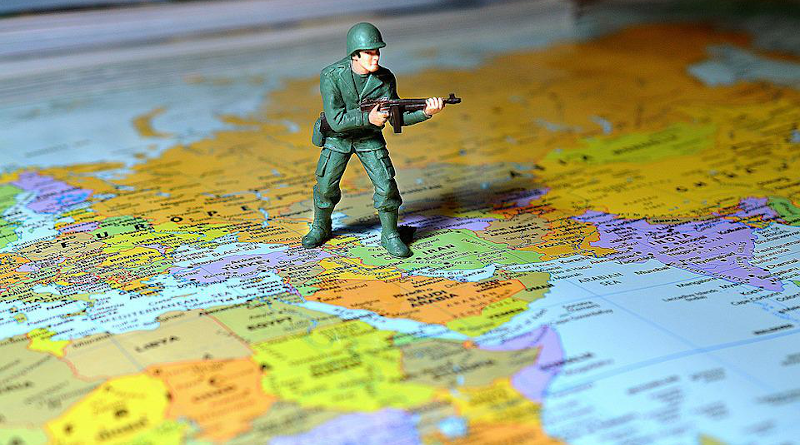The Middle East: A New Arena For US-China Cold War – OpEd
The cold war has never ended after the bifurcation of the former USSR rather it has taken a new shape by entering new players into the arena. The world has now converted from unipolar to multipolar world with the rising China. Along with other areas of the world the Middle East has become a new battlefield of cold war between America and China.
The mighty project of projects the BRI of China has penetrated the MENA region which enjoys the pertinent place of the BRI. The Oil and Gas rich region the Middle East will be crucial for the bilateral cold war between two heavyweights where China is penetrating with a bang. The move of detente between Saudi Arabia and Iran brokered by China could be a game changer.
During a couple of years China has become the biggest trade partner of the GCC and is moving toward establishing trade relations with the rest of the Middle Eastern countries. But, at the same time, it is uncertain in near future that China will replace America in the Middle East.
After the second world war, America has been cementing its relations with the Middle Eastern countries with special focus on military relations where it has been providing security to dozen of the Middle Eastern countries by establishing military bases in the region. While, China has only one base in the Djibouti adjacent to the Suez canal in Egypt.
History testifies that Chinese involvement in the region is distinctive from America. China is intervening in the region through its soft power penetration, by its policy of non-alignmnet and non-intervention in the regional affairs of the region. It has a policy to penetrate through investment and trade. While, the US policy has been security centric as per the convenience to its economic policies as American economy is a war economy and creating war or war like situation in the region suits it.
Israel, that has been a proxy of America has adopted a stratagem to threaten a country and then step in other countries on the pretext of security threat. The Yinon plan of 1982 is a reflection of it to bifurcate the Arab Middle Eastern countries so that to fulfill its design of greater Israel for Which George W. Bush senior is said to be impressed and formulated policies as per the Plan. Both America and Israel were against Saddam Hussian and supported Saddam,s opponents meanwhile, both states have been against Iran and supported anti_Iranian sanctions. On the other side, China has a diverse policy to bring peace between belligerent and the current initiative of pouring cold water between the enmity between Iran and Saudi Arabia is a lustering example. Meanwhile, China has also offered Israel that it is ready to play a role of meditariay to settle its issues with the other Middle Eastern countries.
The Chinese interests in the region are mainly based to cement itself as economic power and occupy trade markets of the region which is pertinent for its BRI project through investment. For instance, China initiated in 2004 China-Arab states cooperation, in 2010 it made China-Gulf cooperation council for strategic dialogue, whereas in 2021, China-Arab summit took place. As per the investment in 2023, China invested 23% of the total amount of the BRI in the region. It has also been investing in Jeddah airport in Saudi Arabia, started investment in Egypt’s Suiz canal, started investment in Iraq and Oman, and most importantly, it signed a 400 billion USD agreement with Iran. Apart from this, China has also helping most countries of the region in military and IT fields. Muhammad Eslami and Maria write that China’s investment in the Middle East has reshaped the region,s landscape, expanding byond traditional energy sources to economic, geopolitical, and strategic considerations.
Notwithstanding, China which is becoming one of the biggest importer of oil, wishes to have a free flow of energy and de-dollarization in the region. Whereas, its economic investment in the region has increased many folds since 2000 by slipping the US exports.
As far as America is concerned, its interests are to ensure free flow of oil and have a strong hold on the mechanism of oil prices of the region. It wished to stop nuclearization (despite favoring the Israeli nuclear program), to secure the security of Israel, to encounter Iran and anti-American forces such as China, Russia, and other regional leaders such as Bashar ul Asad, and last but not least to halt terrorist threats from the regions (Inspite going into the details that who made Al_Qaida and the ISIS).
The Middle East has become a new emerging place of cold war between China and America. Both are in struggle to encounter eachother and penetrate the region. China is moving like a snail slowly and steadily by setting its feet through neutrality, mediations, and investment via the BRI. While, the American stratagem has been to intervene, to make a war like situation, and threaten the Middle Eastern countries by its proxy Israel.
However, China has penetrated through its soft power diplomacy and investment through the BRI, but it is still uncertain that it will replace America in the region soon. It is due to the fact that America is still one of the most important world leaders who has huge and strong economic and military interests in the region where dozens of the Middle Eastern countries are dependent on its security yet.

